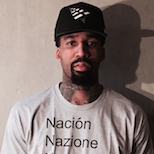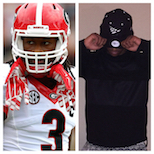Directors Coodie & Chike Discuss ESPN’s “Benji”
10.23.2012
SPORTS
Directors Coodie Simmons and Chike Ozay have made a strong name for themselves in recent years via music videos and short films released under their Creative Control umbrella, dating all the way back to Kanye West‘s first video, “Through The Wire.” They’re looking to take their game to the next level now, using ESPN as a platform to tell the incredible story of Chicago’s Benji Wilson. Wilson was the top high school basketball player in the nation in 1984, before he was senselessly killed just a block away from his high school, Simeon Career Academy. Since then, he’s emerged as an urban legend, especially as Simeon has become one of the most successful prep basketball programs in the country, boasting Derrick Rose as an alum, Jabari Parker – the top player in the class of 2013 – as the second-coming, and five state championships since 2006.
In the latest addition to acclaimed ESPN’s 30 For 30 documentary series, Coodie and Chike tell the story of “Benji,” revealing information that for decades has been unknown to many, including an interview with Billy Moore, the man who gunned down Wilson on Nov. 20, 1984. Here, along with producers Ted Schillinger and Amani Martin, Coodie and Chike talk about their experience filming the movie and bringing Wilson’s story to the masses.
Life+Times: How familiar were you all with the Ben Wilson story before doing the movie?
Chike Ozay: Well I played ball. I didn’t play in college, but I played AAU so obviously I had dreams of playing on a larger level. So I was surprised when I met Coodie – this was in my mid-20s – that I had no clue of who this guy [Ben Wilson] was. When he told me the story, I couldn’t believe that I had never heard about him. And I felt, “damn, that’s crazy,” because so many people probably share that same feeling with me. This was 10 years ago. I was fascinated from that point on.
Coodie Simmons: Well I’m from Chicago, so I had heard about him and knew about him when he was playing. I was in 7th grade at the time of his death, but in 6th grade we used to try to sneak up to the games. I couldn’t go too far out of my neighborhood, so I couldn’t go to the park where he played, but when he would come to Julian [High School in Chicago], it was always a big thing about him and Byron Irvin. We used to try to sneak up there and see him, but we never got an opportunity.
L+T: Being from Chicago then, did you learn anything interviewing all of the people that made you say, “wow, I didn’t even know that?”
CS: It was always one of those things where I didn’t really know what happened, but hearing the story, I figured that’s exactly what happened. The story from Billy Moore and all of his [Ben Wilson’s] good friends, like Mario Coleman and Shawn Wright, they believe the same. Because you know how it is in Chicago, we don’t wanna get punked. And that was the whole situation, neither one of them [Wilson or Billy Moore] wanted to get punked. That was the definite thing that got to me. Everything else I pretty much knew through the papers and through stories.
L+T: What pushed you to do this story on Ben Wilson?
CO: We had been working on the story for so long as a theatrical narrative that we wanted to tell, and that process was kind of exhausted, dealing with the politics of trying to make it happen, so we kind of put it to the side for awhile and focused on our online network. My girlfriend was at ESPN and her boss, Keith Clinkscales ran the content ran the content at the time. She thought that he should meet us just because of what we were doing at Creative Control, so she was pressing him to take a meeting with us. Eventually he did and it was really about Creative Control, but in that meeting – we’re at ESPN – Coodie was like this is perfect place to bring up some of our other projects that we had been working on.
CS: It’s funny how it happened because this guy Mike Walton called me and was like, “dude, you see these 30 For 30 documentaries that ESPN is doing?” Me and Chike had already been checking them out. Right after that, Chike’s girlfriend started working for Keith; then after that, we were like we’re gonna go right in there with the Ben. We really knew, Creative Control was good, but we’re about to go in there with that Ben.
L+T: Chicago, of course, has been all over the news with the killings going on. So, it’s just ironic that, as all of that is going, this film comes out.
CS: God just doesn’t make mistakes. And I know when Ben Wilson got shot and killed in Chicago, it actually changed the whole environment of the streets. The gangs did a truce, the crime rate went down. I’ve seen it. I’ve seen where it used to be dangerous to go places, then all of a sudden it wasn’t as dangerous. People weren’t even on that during the time of his death, it was really something to see. I knew that in doing this movie and telling that story, we can get that same impact that he had then with the story now.
L+T: What was the reaction, especially in Chicago, when you told people that you were doing a documentary on Ben Wilson?
CS: Everybody was happy, but then they were apprehensive because they were like, “Coodie?” Because I used to do standup comedy and a lot of people know me in Chicago, so they really didn’t believe that I was doing it with ESPN or anything.
CO: We actually had to start sticking [producer] Ted [Schillinger] on them so they would take it serious.
Amani Martin: This was not easy to get people comfortable. A lot of people were traumatized, they didn’t want to talk about it. A lot of people are still carrying the trauma, and what Coodie and Chike were great at and naturals at, was getting people to be comfortable talking about something that was difficult for them to talk about. If you see the emotion that’s coming out in a lot of the interviews, that doesn’t come from reading off a list of questions. Billy Moore, in particular, sticks out for a lot of people. Without them [Coodie and Chike], we wouldn’t have gotten him. He wouldn’t have been part of a different Ben Wilson film.
Ted Schillinger: A lot of these folks were reluctant. It wasn’t just, “will they share, will they not share?” It was, “will they even come to the table?” Billy had to trust them. He had a long road to travel back to trust these guys to tell his story. And he was right to trust them. I was really impressed with how ferociously they fought for Billy getting a fair deal in the film. And they stuck to it, they kept their promise to Billy, he was right to trust them and I thought that was a really beautiful thing.
L+T: Was the response mostly positive when you asked people to be a part of it?
CS: For the most part yeah, but that’s where we’ve got to give big ups to Mario Coleman, who was Ben Wilson’s best friend. He pretty much helped us get everybody in the film.
CO: It would have been way more difficult without his [Coleman’s] involvement, because they trusted him with the story. You gotta understand, even to this point now, people don’t have closure on this situation.
L+T: Who was the most revealing or intriguing person that you all interviewed?
CS: R. Kelly was definitely one. We heard he played with him, and then he said he sang at the funeral, so we’re asking everyone [we interviewed] did he sing at the funeral? They’re like, “naw, he didn’t sing at the funeral.” But come to find out, we saw an obituary and it had a song selection by Kenwood Academy Choir and that’s who he used to sing with. He actually did sing and that’s how we find out. We didn’t know he was gonna sing that song like [in the movie] either.
CO: I’d have to say Erica [Murphy] because she’s at a pivotal point in the story because she knew both – Billy and Benji. So to me, that was like checkmate in a sense when she came and her story was incorporated. She really brought everything together, full circle, in one answer, you know.
L+T: For you all as directors, how did you enjoy your time shooting the documentary, especially compared to the music videos and short videos that most people are familiar with you doing?
CS: I fell into videos. I had a show called Channel Zero, so my whole thing was TV, movies and documentary shows. I was filming Kanye, doing a documentary because I’m like, “he’s gonna make it.” I saw people not believing in him and I believe in him so I started filming him. I was doing like a Hoop Dreams documentary on him. Time goes by, he signs to Roc-A-Fella, has a car accident, we come up with an idea but didn’t know how to execute so we called Chike who was at MTV at the time. Next thing I know, me and Chike are directing videos, and luckily it came all the way back around to doing documentaries. We’re first-time filmmakers, so I thank God that we had experienced filmmakers, the producers Ted and Imani. They’ve made long-form films, so we really cheated a little bit.
CO: The ultimate goal of ours is to do features. Before this, there’s probably four or five features we already had written up. Financially, resource-wise we just haven’t been able to execute them on our own, and dealing with the politics of studios, we just hadn’t caught that break yet. So this is closest opportunity we’ve had to reach that goal. So it’s something we’ve been anticipating. It’s different [music videos and features]. You’ve gotta have way more stamina and endurance. These guys [Martin and Schillinger] will tell you, you’re in this edit room, the same room for a long time, and it’s a huge team involved. It’s an enduring process, from the writing, countless outlines that are done, creating and re-creating, it’s way different than a music video. It’s a music video times 10,000.
Benji airs on ESPN Tuesday, Oct. 23rd at 8 PM ET.





